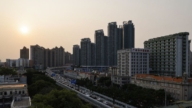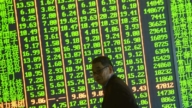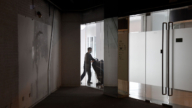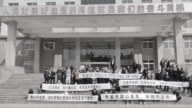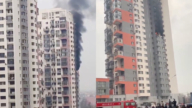【新唐人2014年07月25日訊】持續低迷的中國房地產市場,讓外界日益擔憂中國的經濟。日前,中共總理李克強在一次內部談話中說,中國的經濟問題就是房地產經濟問題。為解決這些問題,李克強對大陸房地產開出了4個藥方。那麼,這些藥方對救治房市有用嗎?而搖搖欲墜的房市會砸倒中國的經濟嗎?請看專家的分析。
大陸媒體《贏商網》7月21號報導,李克強在召集專家召開緊急協商會議之後,發表了《李克強總理對中國房地產對症下藥開出的四個藥方》。
在文章中,李克強承認「中國的經濟基本上就是房地產經濟,中國的經濟問題基本上就是房地產經濟問題」。
為解決問題,李克強開出了四個藥方:嚴控貸款額度,切斷開發房地產的資金來源﹔向開發商徵收增值稅﹔強迫官員等購房群體做不動產登記,以及徵收房產稅。
美國南卡羅萊納大學艾肯商學院教授謝田:「李克強政府對付中國房地產問題的4個藥方,比如第一個,像前一段時間也已經對貸款出現了一些收緊,但後來又慢慢的放鬆了。現在,中共中央政府在向各地地方政府要求加大支出,用大量基建的方式向房地產市場和基本建設類市場投入資金。所以,我看不出有甚麼前景。」
美國「南卡羅萊納大學艾肯商學院」教授謝田表示,中共實際上做法是互相矛盾的,一方面想控制資金的投入,另一方面,為了維持經濟,又不得不繼續投入。
資料顯示,中國房地產經濟佔到經濟總量GDP的6.6%和15%的投資,與房地產相關聯的的行業達到60個。中國金融機構在房地產領域的貸款(包括開發商貸款、土地貸款和個人住房貸款)也已經達到幾十萬億。
中國國家信息中心經濟預測部主任祝寶良曾對外公開表示,中國60%的製造業與房地產有關,所有的融資,包括銀行貸款、地方政府融資平臺、信託,60%與房地產有關聯,如果房地產業出現大問題,對經濟影響相當大。
今年以來,大陸樓市已呈現「寒冬」景象。 2月下旬,杭州引發的樓盤「降價潮」席捲全中國﹔在武漢相城區的「西湖君庭」,甚至打出6折優惠﹔北京則推出「零首付」樓盤。
中共國家統計局7月18號公布中國70座中大城市的房價指數,不僅二、三線城市的樓市價格持續下跌,一線城市的價格也連續兩個月出現下跌。
在房價持續走低的形勢下,很多地方政府開始取消限購,而限價、限貸政策也在鬆動。
不過,中國的新建建築的總數量同去年同期相比,卻繼續不斷上升,五月與六月的新增比率分別為5.35%和4.05%。
房地產價格持續下跌,為何還繼續投資房地產行業?
大陸金融師任中道:「因為不建,地方政府不出讓土地就沒有錢去還債,房地產商不拿地,就沒有把用地作為抵押去貸款,或者是去發行信託、理財產品等,所以,他們為了把那些錢回籠,還是會建房子,現在已經成了一個惡性的循環。」
大陸金融師任中道表示,由於房地產佔中國整個的經濟GDP的比重很高,一旦出問題,不僅會衝擊金融系統、與之相關的上下遊行業,如建材、建築等都會受到影響。
另外,因揭發中國上市公司會計造假行為,而聞名的美國「渾水公司」創始人卡森•布洛克認為,中國正面臨「巨大的信貸和資產泡沫」,大量貸款進入非生產性資產領域,將引發高額壞賬風險。他表示,一旦房地產泡沫破裂,中國GDP最高將縮水25%,GDP增長率將會跌到2%。
大陸經濟學家馬光遠在個人博客發文說,現在房地產泡沫很大,不僅無力刺破,更重要的是,一旦刺破,無異於中國經濟的自殺。他表示,中國房地產投資佔到GDP15%以上,中國經濟已經完全淪為房地產經濟,房地產一旦出大問題,中國經濟必然崩潰。
採訪編輯/易如 後製/舒燦
The Chinese real estate market remains in the doldrums,
and the world is increasingly worried about China’s economy.
Recently, Chinese Communist Party (CCP) Premier Li Keqiang
said in an internal conversation that China’s economic
problem is the real estate economy.
In order to solve the problem, Li Keqiang issued four key
remedial measures to recover Mainland real estate.
So, are these prescriptions for treating
the housing market useful?
Will the crumbling housing market induce the collapse
of China’s economy?
Let’s see experts’ analysis.
On July 21, Mainland media outlet Win Business Network
reported that Li Keqiang published the article “Premier Li
Keqiang Issued Four Prescriptions Ror Remedying China’s
Real Estate Issues,” after an emergency consultative meeting.
In the article, Li admitted that, “China’s economy is
basically the real estate economy,
and China’s economic problems are basically
real estate economic problems."
Li Keqiang issued four prescriptions to deal with real estate
problems – strictly controlling loans to developers
and cutting off funding sources for the development
of real estate;
imposing value-added tax on developers;
forcing the recording of properties bought and owned
by officials; as well as launching property tax.
University of South Carolina Aiken School of Business
Professor Frank Xie in the US:
“Li Keqiang gave four prescriptions to deal
with four real estate issues.
Recently the government also tightened lending on property
developers, but then standards were slowly relaxed.
Currently the CCP Central government required local
governments to increase expenditure by investing
in infrastructure and real estate development.
So I do not see any prospects in the four prescriptions."
Professor Frank Xie said the CCP’s numerous measures
contradict each other.
On the one hand, they want to constrain investment;
on the other hand, in order to maintain economic
development, they have to continue to boost investment.
Statistics show that China’s real estate industry accounts
for 6.6 percent and 15 percent of the total GDP
and investment, respectively.
There are 60 industries associated
with the real estate industry.
The total scale of the real estate loans (including loans
to developers, land loans and personal housing loans)
offered by Chinese financial institutions has reached
tens of trillions.
Zhu Baoliang is the Director of Economic Forecasting
Department of China State Information Center.
He publicly stated that 60 percent of China’s manufacturing
activities were related to the real estate industry.
60 percent of all financing activities including bank loans
as well as local government financing platforms and trusts,
are associated with the real estate industry.
If a big problem is exposed in the real estate field,
then the economy will be considerably impacted.
This year, the Mainland property market has shown signs
of bleakness.
In late February, real estate “price cuts" triggered
in Hangzhou are sweeping across China.
The property development project, “West Lake Chamber"
in Xiangcheng District of Wuhan City even hit a 60 percent
discount whereas Beijing launched “zero down payment"
on properties.
On July 18, the CCP National Bureau of Statistics
announced the housing price index of 70 Chinese cities.
The index shows that not only do property prices
in the second and third tier cities continue to fall,
but also values in the first-tier cities fell
for two consecutive months.
Under the conditions of the continued property market
decline, many local governments began to abandon
the purchase limit and have loosened property price limit
and credit limit policies.
However, compared to last year, the total number of China’s
new buildings continue to rise, and the new building
increases with rates of 5.35 percent and 4.05 percent
in May and June, respectively.
Real estate prices continue to fall, but why do investments
continue to flow into the real estate industry?
Mainland finance analyst Ren Zhongdao:
“Without constructing new buildings,
the local governments do not sell land,
and then they have no money to pay debts.
If the real estate developers do not buy land,
then they have no land to use as loan collateral
or issue trusts and other financial products.
Therefore, in order to return the money,
they still have to construct buildings.
Now this has become a vicious cycle."
Ren Zhongdao said that as the real estate field accounts
for a high proportion of the Chinese GDP, once problems
break out, not only will the financial system be impacted,
but also all construction-related industries will be hit as well.
The United States-based ‘Muddy Waters’ company founder
Carson Block is famous for revealing accounting fraud
of publicly listed Chinese companies.
He believes that China is facing “huge credit and asset
bubbles," and a large number of loans flowing into the field
of non-productive assets will lead to a high credit risk.
He believes that once the real estate bubble bursts,
the Chinese GDP will shrink up to 25 percent
and GDP growth will fall by 2 percent.
Mainland economist Ma Guangyuan
commented in his personal blog post that
now the real estate bubble is significantly large.
It is unable to be pierced.
More importantly, once punctured, it is tantamount
to the suicide of the Chinese economy.
He believes that the Chinese real estate investment
accounts for more than 15 percent of GDP.
The Chinese economy has been completely dominated
by the real estate industry.
Once big problems occur in the real estate field,
the Chinese economy will inevitably collapse.
Interview & Edit/YiRu Post-Production/ShuChan




